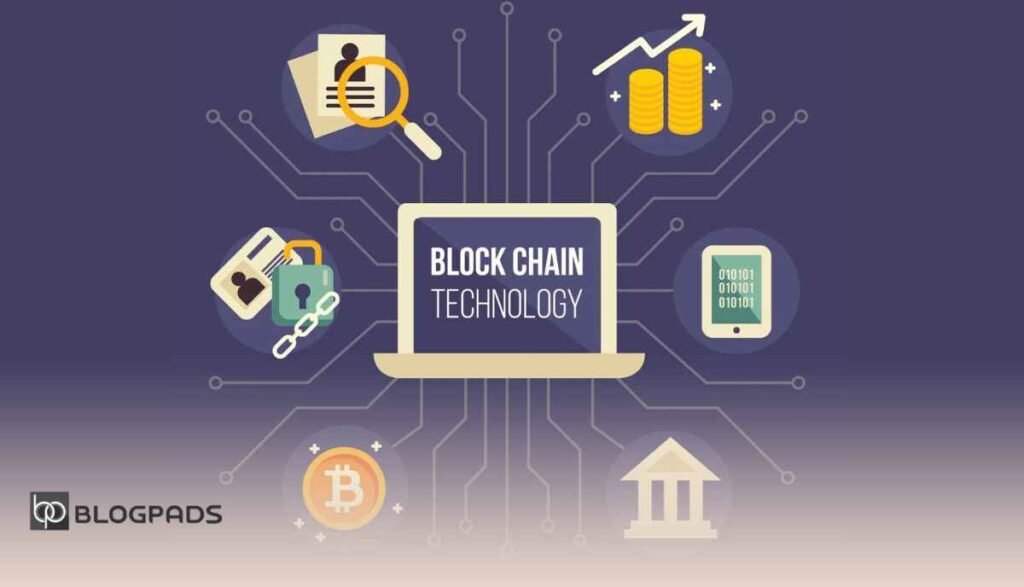1. What Is Blockchain Technology?
Blockchain technology is this ledger, offering a secure, transparent, and decentralized way to record and verify data.
2. A Brief History of Blockchain
Over the years, blockchain evolved beyond cryptocurrencies, finding applications in various industries, from finance to healthcare.
3. How Does Blockchain Work?
At its core, blockchain is a chain of digital blocks containing data. Here’s a simplified process:
- A transaction is requested.
- The transaction is verified by a network of computers (nodes).
- Once verified, the transaction is added to a block.
- This block is linked to previous blocks, forming a chain.
- The transaction is now immutable and visible to all participants.
4. Key Features of Blockchain
- Decentralization: No central authority controls the network.
- Transparency: Every participant can view the transaction history.
- Immutability: Data cannot be altered once recorded.
- Security: Advanced cryptography ensures data safety.
5. Types of Blockchain Networks
Blockchain networks come in different flavors, each serving specific needs:
- Public Blockchains: Open to everyone (e.g., Bitcoin, Ethereum).
- Consortium Blockchains: Controlled by a group of organizations.
- Hybrid Blockchains: A mix of public and private features.
6. Applications of Blockchain Technology
Blockchain’s potential stretches far beyond cryptocurrency. Here are some areas where it’s making waves:
- Finance: Faster, cheaper transactions without middlemen.
- Voting: Ensuring transparent and tamper-proof elections.
- Real Estate: Simplifying property transfers with smart contracts.
7. Blockchain and Cryptocurrencies
Blockchain and cryptocurrencies are often mentioned together, but they’re not the same. is the technology, while cryptocurrencies like Bitcoin and Ethereum are digital assets that run on blockchain networks.
8. Blockchain in Healthcare
Imagine a world where your medical history is accessible to any doctor you visit, no matter where you are, but only with your permission. Blockchain makes this possible, ensuring data accuracy and privacy.
9. Blockchain in Supply Chain Management
From farm to fork, blockchain can track every step of a product’s journey, ensuring authenticity and reducing fraud. This transparency benefits businesses and consumers alike.
10. Benefits of Blockchain Technology
- Enhanced Security: Data breaches become nearly impossible.
- Cost Efficiency: Eliminates intermediaries, reducing transaction costs.
- Improved Trust: Transparency builds confidence among participants.
11. Challenges and Limitations
Blockchain isn’t perfect. Here are some hurdles:
- Scalability Issues: Processing large volumes of transactions is challenging.
- Energy Consumption: Mining cryptocurrencies consumes significant energy.
12. The Future of Blockchain
Experts believe blockchain will revolutionize industries like finance, healthcare, and education. As technology advances, it may become as ubiquitous as the internet itself.
13. How to Get Started with Blockchain
Curious about diving into blockchain? Start by learning the basics through online courses. Experiment with tools like Ethereum or Hyperledger to build your first blockchain application.
14. Busting Common Blockchain Myths
- “Blockchain is only for techies.” Not true! Anyone can learn and benefit.
- “Blockchain and Bitcoin are the same.” They’re related but not identical.
- “Blockchain is completely secure.” While highly secure, no system is 100% immune to vulnerabilities.
15. Why Blockchain Matters to Everyone
Whether you’re an entrepreneur, student, or consumer, blockchain has something for you. It’s about more than technology—it’s about trust and empowerment in the digital age.
Conclusion
Blockchain technology is more than a buzzword—it’s a game-changer that’s transforming industries and lives. From improving transparency to enhancing security, its potential is limitless. While challenges exist, the innovation and promise of blockchain are undeniable. As we embrace this technology, we move closer to a future where trust and transparency are foundational to everything we do.
FAQs
1. What is blockchain technology in simple terms?
Blockchain is a digital ledger that records transactions securely and transparently without relying on a central authority.
2. How is blockchain used in everyday life?
It’s used in banking for secure payments, supply chains for tracking goods, and even voting systems for transparent elections.
3. Is blockchain only about cryptocurrencies?
No, while blockchain powers cryptocurrencies, its applications extend to healthcare, real estate, and more.
4. What are smart contracts in blockchain?
Smart contracts are self-executing agreements with terms written directly into code, running on blockchain networks.
5. Can blockchain be hacked?
Hacking blockchain is extremely difficult due to its decentralized and cryptographic nature, but no system is completely foolproof.

